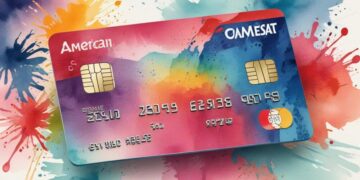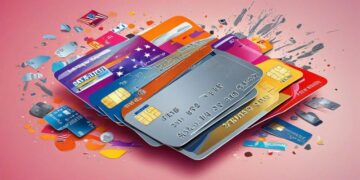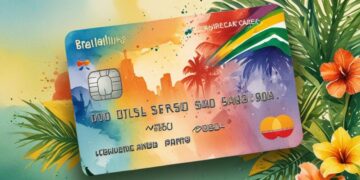The Benefits and Risks of Using Credit Cards in Building Personal Credit

Understanding Credit Cards: A Path to Financial Empowerment
Credit cards offer an array of opportunities for personal growth and financial empowerment, allowing individuals to establish and enhance their credit profiles. Embracing the advantages of credit cards can significantly impact your financial trajectory, leading to vibrant opportunities in the pursuit of your goals. However, to harness their full potential, it’s crucial to navigate their complexities with diligence and mindfulness.
One of the significant benefits of using credit cards responsibly is the potential for an improved credit score. Timely payments and maintaining low credit utilization are essential practices that can elevate your credit rating over time. For instance, if you manage to pay off your balance in full each month, you showcase reliability to lenders, making it easier to secure loans for cars or homes in the future.
Moreover, many credit cards come with enticing rewards and perks that can enhance your purchasing power and create a more enjoyable spending experience. Whether it’s cashback on grocery shopping, points redeemable for travel, or exclusive discounts, these rewards can save you money and make essential purchases more rewarding. For example, a card that offers 2% cashback on everyday purchases could effectively give you $200 back each year if you spend $10,000—extra cash that could go towards a vacation or savings.
Convenience is another valuable aspect of credit card use. With digital transactions on the rise, carrying cash is becoming less practical. Credit cards provide a safe and easy way to manage expenses without the fear of theft associated with cash. They often come equipped with fraud protection policies, adding another layer of safety. This means you can shop online with a measure of peace, knowing that you’re safeguarded against potential fraud.
However, it’s essential to balance these rewards with an awareness of the risks involved. An alluring aspect of credit cards is also their potential to lead to debt accumulation. It’s easy to fall into the trap of overspending, especially when cards make high-ticket items accessible with just a swipe. If you find yourself living beyond your means, the consequences can be dire and lead to a cycle of debt that feels insurmountable.
Additionally, credit cards often come with high-interest rates. If a balance is carried from month to month, it can incur costly fees that compound over time, making your purchases significantly more expensive than anticipated. For instance, carrying a $1,000 balance at an average APR of 20% could lead to $200 in interest charges within just a year if not paid off. Such mounting costs can quickly become an overwhelming financial burden.
Lastly, the impact on your credit score is profound and should not be overlooked. Late payments or defaulting on credit card bills can notably damage your credit standing, making it challenging to secure loans or favorable terms in the future. It can take years to recover from a single missed payment. Therefore, it’s paramount to stay organized and aware of your payment deadlines.
By approaching credit cards with a blend of strategic planning and informed decision-making, you can steer your financial journey towards a path of success. Empower yourself with knowledge, adopt responsible practices, and transform credit cards into powerful instruments that will pave the way for a financially stable and prosperous future. Your journey to becoming a savvy credit user begins today.
Maximizing Benefits While Mitigating Risks
Embracing the world of credit cards can be a double-edged sword; understanding this balance is vital for building a solid personal credit history. While credit cards can provide you with the tools needed for financial advancement, it is essential to appreciate both the benefits they offer and the risks they present. By educating yourself and implementing mindful practices, you can create a powerful credit profile that positions you for future financial successes.
Leveraging the Benefits of Credit Cards
Understanding how to unlock the myriad benefits of credit cards allows you to make the most of your financial journey. The positive aspects include:
- Credit Score Advancement: As mentioned, making timely payments and keeping your credit utilization low are pivotal in enhancing your credit score. A higher score signifies to lenders that you are a responsible borrower, unlocking better interest rates and terms for loans down the line.
- Rewards and Cash Back: Many credit cards offer enticing reward programs that cater to everyday spending habits. Whether earning points for travel, cash back on groceries, or discounts on purchases, these perks add value to your routine financial transactions.
- Emergencies and Unforeseen Expenses: Having a credit card can act as a safety net during emergencies. Whether facing unexpected medical bills or urgent car repairs, credit cards allow you to cover these expenses without immediate financial strain, enabling time to pay it back thoughtfully.
- Building Financial Discipline: Using a credit card for regular expenses can teach financial responsibility. By committing to pay off expenditures each month, you cultivate a habit of budgeting and prioritize what is essential, fostering long-term fiscal health.
Navigating the Risks Involved
While the potential upsides are substantial, it is equally important to recognize and navigate the risks associated with credit card use. The following pitfalls often catch consumers off guard:
- Debt Accumulation: The flexibility of spending with credit cards can lead to overspending if not monitored. It is crucial to stay within your budget to avoid falling into debt that could be overwhelming.
- High-Interest Rates: Many credit cards carry high-interest rates, especially if you miss payments or carry a balance. Understanding the cost of borrowing is vital, as these fees can easily outweigh any rewards or benefits obtained from card usage.
- Negative Impact on Credit Score: The consequences of late payments or accumulating too much debt can be damaging. A single missed payment can linger on your credit report for years, significantly affecting your credit score and long-term borrowing ability.
By assessing these benefits and risks, you can make informed decisions about credit card usage that aligns with your personal financial goals. Striving for a balance between enjoying the advantages they present and being wary of potential pitfalls will ensure that you remain on the path toward financial empowerment.
Creating a Strategy for Smart Credit Card Usage
As you navigate the complex landscape of credit cards, developing a clear strategy can empower you to harness their benefits while effectively managing risks. A proactive approach to credit card usage not only enhances your credit profile but can also lead to significant financial advantages in the long run. Here are several best practices to consider:
Adopting a Responsible Spending Approach
To truly benefit from credit cards, consider embracing a mindset of responsibility. This begins with establishing a clear budget. Tracking your monthly spending and setting limits on how much you will charge to your card helps to keep your expenses in check. Utilize budgeting apps or spreadsheets to maintain transparency over your finances.
Moreover, adopt the habit of only charging what you can afford to pay off each month. This prevents the cycle of accumulating debt and ensures that you fully benefit from your card’s positive aspects, like rewards and cash back, without the looming threat of interest rates.
Utilizing Automated Payments
Another effective method to manage your credit card debt and avoid negative repercussions is to set up automated payments. Choosing to have your card payments automatically deducted each month ensures that you never miss a payment deadline, which is crucial for maintaining a strong credit score. Many financial institutions allow you to customize your payment settings, enabling you to choose the amount to be paid – whether it’s the minimum due or the full balance.
Furthermore, automating payments can reduce the mental burden associated with tracking due dates and amounts, allowing you to maintain your financial focus without added stress. It creates a worry-free approach where you ensure timely payments while building a healthy credit history.
Staying Informed and Reviewing Your Credit Reports
A key part of a successful strategy is regular engagement with your financial well-being. Monitoring your credit report is essential for understanding how your credit card usage impacts your credit score. By reviewing your reports at least once a year, you not only confirm that the reported information is accurate but also gain insight into areas for improvement. The three major credit bureaus in the United States—Experian, Equifax, and TransUnion—offer free access to your credit report annually.
Additionally, paying attention to your credit utilization ratio—how much credit you’re using relative to your total credit limit—can guide your financial decisions. Keeping this ratio below 30% is recommended to maintain a favorable impact on your credit score. This means if you have a combined credit limit of $10,000 across your credit cards, aim to maintain a balance of $3,000 or less.
Building a Diverse Credit Portfolio
Lastly, as you grow in your credit journey, consider the merits of diversifying your credit mix. This means exploring different types of credit, such as installment loans for cars or mortgages alongside your credit cards. Having a variety of credit accounts can bolster your overall credit score and demonstrate to lenders your ability to manage different types of debt responsibly.
The journey of using credit cards as a tool for building personal credit is not just about spending wisely; it’s about being proactive, informed, and deliberate in your approach. By implementing these strategies, you can position yourself firmly on the path to achieving your financial aspirations, empowered by a foundation of solid credit health.
Conclusion
In the ever-evolving landscape of personal finance, credit cards stand out as powerful tools that can pave the way to building a robust credit profile. As highlighted in this article, the benefits of utilizing credit cards—including the potential for rewards, cash back, and positively influencing your credit score—are compelling. However, these advantages come with inherent risks, namely the temptation to overspend and the burden of high-interest debt if mismanaged.
The journey to financial empowerment through smart credit card usage begins with self-awareness and a commitment to responsible financial habits. By implementing strategies such as budgeting, setting up automated payments, and diversifying your credit portfolio, you can effectively mitigate risks and harness the full advantages that credit cards offer. Knowledge and diligence are your allies—understanding your credit reports, monitoring your credit utilization, and making informed decisions will lay the groundwork for a healthy credit history.
Ultimately, building personal credit is not just about the numbers; it’s about cultivating a mindset that prioritizes sustainability and fiscal responsibility. As you embark on this vital aspect of your financial journey, remember that each small step contributes to a greater goal. Use credit cards wisely and let them be a stepping stone to your financial aspirations, ensuring you set your future self up for success. With the right approach, you can thrive financially while enjoying the perks that credit cards provide.
Related posts:
The Impact of Credit Cards on Online Shopping: Advantages and Disadvantages
Unlocking Exclusive Travel Benefits with the Delta SkyMiles Platinum American Express Card
How to Apply for the Discover it Cash Back Credit Card A Step-by-Step Guide
The Ultimate Guide to the U.S. Bank Altitude Reserve Visa Infinite Credit Card
The Role of Credit Cards in Personal Budget Management: Practical Tips
A Comprehensive Guide to the Emirates Skywards Premium Mastercard: Unlocking Exclusive Travel Benefi...

Beatriz Johnson is a seasoned financial analyst and writer with a passion for simplifying the complexities of economics and finance. With over a decade of experience in the industry, she specializes in topics like personal finance, investment strategies, and global economic trends. Through her work on Web Dinheiro, Beatriz empowers readers to make informed financial decisions and stay ahead in the ever-changing economic landscape.






